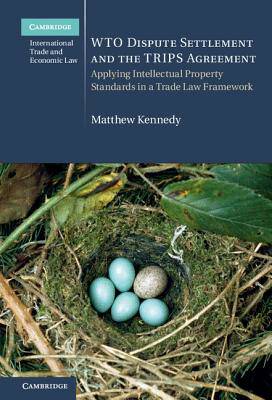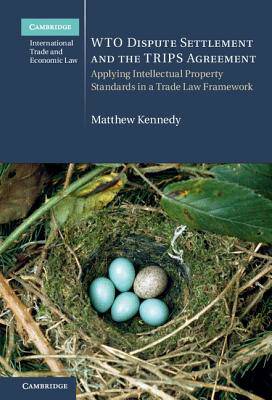
- Afhalen na 1 uur in een winkel met voorraad
- Gratis thuislevering in België vanaf € 30
- Ruim aanbod met 7 miljoen producten
- Afhalen na 1 uur in een winkel met voorraad
- Gratis thuislevering in België vanaf € 30
- Ruim aanbod met 7 miljoen producten
Wto Dispute Settlement and the Trips Agreement
Applying Intellectual Property Standards in a Trade Law Framework
Matthew Kennedy
€ 245,45
+ 490 punten
Uitvoering
Omschrijving
The TRIPS Agreement was implemented in the WTO to gain access to a functioning dispute settlement mechanism that could authorize trade sanctions. Yet TRIPS and the WTO Dispute Settlement Understanding are based on systems that developed independently in WIPO and GATT. In this book, Matthew Kennedy exposes the challenges created by the integration and independence of TRIPS within the WTO by examining how this trade organization comes to grips with intellectual property disputes. He contrasts the way intellectual property disputes between governments have been handled before and after the establishment of the WTO. Based on practical experience, this book provides a comprehensive review of the issues that arise under the DSU, TRIPS, GATT 1994 and other WTO agreements in intellectual property matters. These range from procedural pitfalls to substantive treaty interpretation and conflicts as well as remedies, including cross-retaliation.
Specificaties
Betrokkenen
- Auteur(s):
- Uitgeverij:
Inhoud
- Aantal bladzijden:
- 498
- Taal:
- Engels
- Reeks:
- Reeksnummer:
- nr. 24
Eigenschappen
- Productcode (EAN):
- 9781107144682
- Verschijningsdatum:
- 21/04/2016
- Uitvoering:
- Hardcover
- Formaat:
- Genaaid
- Afmetingen:
- 152 mm x 229 mm
- Gewicht:
- 830 g

Alleen bij Standaard Boekhandel
+ 490 punten op je klantenkaart van Standaard Boekhandel
Beoordelingen
We publiceren alleen reviews die voldoen aan de voorwaarden voor reviews. Bekijk onze voorwaarden voor reviews.










